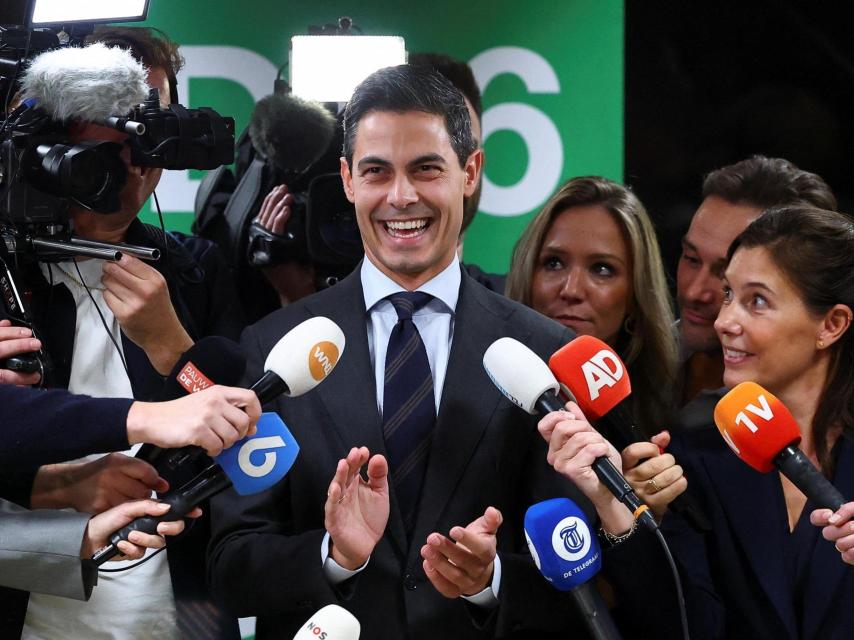Optimism had lost much of its appeal at the polls. In the last election cycle, the protest vote cannibalized Western democracies. But the emergence of a new batch of leaders with a markedly progressive profile seems to be reversing the trend.
These leaders show common traits. As Zohran Mamdani (Kampala, 34 years old), recently elected mayor of New York, are young. Very young. They are not satisfied with appealing to their traditional base of voters, they want to win by speaking the language of the majority and they do not give up playing the populist card to achieve this. They focus on the material conditions of life, without neglecting or ignoring other issues.
These leaders know how to use networks, connect with people through screens. In Europe the case of the socioliberal stands out Rob Jetten (Veghel, 38 years old), the unexpected winner of the Netherlands elections under the brand of Democrats 66 (D66), a centrist party, a minority in its almost six decades of existence.
Jetten took first place at the polls from the far-right Freedom Party (PVV) of Geert Wilders by a difference of 28,400 votes. Few saw it coming.
But he is not the only one. There are more leaders willing to surf the wave of optimism to surprise at the polls. In the United Kingdom, for example, the case of Zack Polanski (Salford, 42 years old).
The new leader of the Green Party uses the framework of Trumpism with the slogan Make Hope Normal Again (Let’s make hope normal again, for its Spanish translation) to attract Labor Party voters, disenchanted with the prime minister’s turn to the right Keir Starmer in economic or immigration matters.
“Polanski talks about ecopopulism, about combining the end of the world with the end of the month,” the essayist explains in conversation with this newspaper. Pablo Stefanoniauthor of Has the rebellion turned right? (Siglo XXI Editores, 2021). “And, like Mamdani, he called the Israeli war in Gaza a genocide.”
British. pic.twitter.com/jnB0xVQ2Fw
— Zack Polanski (@ZackPolanski) October 16, 2025
Polanski’s value is trading on the rise. Voting intention is around 15%, according to the average of the surveys, which place the Greens ahead of the Liberal Democrats, almost tied with the tories and less than four points behind Labour.
The group has reached 150,000 members since Polanski’s victory in the primaries in September. A militant record that the Dutch D66 also experienced, although to a lesser extent.
The return of Yes, we can
Echoes of the Yes, we can that catapulted the White House to Barack Obama in November 2008. In fact, Jetten himself used as his motto It is possible (Yes you can, in Spanish). But Stefanoni does not believe that we are “before the return of positive campaigns in a linear manner. Mamdani’s also had many elements of rejection, among other things, of Trumpism.”
The essayist recognizes, however, that his victory “has breathed a good dose of optimism into an emotionally dejected global left. Winning in the ‘capital of capital’ with a socialist or social democratic discourse is no small feat.” And Mamdani, says Stefanoni, has been able to “combine his personal charisma with the construction of a progressive narrative and a very professional campaign.”
Rob Jetten celebrates the election victory at the D66 headquarters in Leiden.
Reuters
The young migrant from Queens also won without stopping smiling. “[Su sonrisa] “It was not an empty euphoria nor a superficial slogan (…) It is linked to deep reflection, something unusual in a politician, especially one who is at the end of a campaign and has answered the same questions hundreds or thousands of times,” writes the economist. Robert ReichSecretary of Labor during the Administration of Bill Clinton.
“[Mamdani] “He radiates contagious hope and enthusiasm,” adds Reich. “He’s the opposite of Trump’s scowl. “It’s what Americans want and need, especially now.”
“A bitter left will not be able to re-enchant the world,” Stefanoni himself points out in this sense. “Humor is very important. That is why it is advisable to get away from solemnity, from excessive doses of moralism and pastoral progressivism. That is not enough, but it could help reconnect with ordinary people.”
The left wants the formula
Mamdani swept New York with the label of democratic socialism. He is not the first to achieve it, it is true. The city is one of the progressive beacons of the United States. But that label rarely works in the land of the stars and stripes.
The independent senator Bernie Sanders was in charge of opening a path that other figures such as the Democratic congresswoman now follow Alexandria Ocasio Cortez or Mamdani himself.
The European left wants to understand the phenomenon to know if it is possible to replicate it in some way on the Old Continent. For this reason, dozens of organic officials from European progressive parties flew over the Atlantic last week to attend the lesson of Morris KatzMamdani’s campaign manager, with whom he met, among others, the French co-president of the Left group in the European Parliament, Manon Aubryleader of La Francia Insumisa (LFI) of Jean-Luc Mélenchon.
Other cadres of the post-communist Die Linke, such as the co-president of the German formation, Ines Schwerdtneralso passed through the city that never sleeps to learn the recipe for success. Although, as Stefanoni warns, “it is not a question of trying to copy him or thinking that doing what he did will achieve the same results, nor of looking for Mamdanis everywhere.”
“The problem in Europe,” recalls the essayist, “is that experiences like Podemos or Syriza ended in great frustrations. Therefore, any recomposition of the left cannot ignore a balance of those experiences.”

D66 frontman Rob Jetten responds to the press.
Reuters
The center looks for a space
Not only the left aspires to capitalize on the Mamdani phenomenon. The center seeks new impetus in its fight for survival in the era of extremes. For now, it is Jetten himself who leads the way.
The former Minister of Climate and Energy in the fourth Government of Mark Rutte understood the importance of networks a little before Mamdani, and applied the recipes of Roy Kramerhis former advisor, who proposed in his book Why Wilders wins (Why Wilders does win, in Spanish) fight the populists with their own weapons: “Only with struggle, polarization and simple language can the populists be defeated.”
It is true that the leader of D66 took advantage of the fatigue of the Dutch electorate, which had gone to the polls for the third time in less than five years after the collapse of the coalition led by Wilders’ PVV, a Cabinet marked by chaos and internal disputes. It is also true that the liberal progressives made the fragmentation of Parliament profitable. A part of Wilders’ electorate also migrated towards other ultra options such as the Forum for Democracy (FvD) and the more moderate JA21.
But that does not detract from its merit. “Jetten’s appeal was based in part on the optimistic and energetic campaign he carried out, presenting himself as a bridge builder between the left and the right,” he explained in conversation with this newspaper. Stinj van KesselProfessor of Comparative Politics at Queen Mary University of London. “He placed less emphasis on the more progressive issues on the D66 agenda, such as climate change and LGBT rights, and took a tougher stance on immigration.”
“The Dutch people only want to welcome with dignity those fleeing war and violence, but also to be strict with the bad apples that ruin the system,” declared Jetten in the middle of the campaign, who says he supports a “strict, but humane” asylum policy.

Zohran Mamdani during the electoral jornada.
Reuters
Mamdani, on the other hand, stressed in his acceptance speech that New York “will continue to be a city of immigrants, built by immigrants and driven by immigrants. And, starting tonight, led by an immigrant.”
The ideological gap separating Mamdani and Jetten on this issue shows that the left and the center do not have a shared position to counter the right’s arguments.
But the underlying current that unites them is the same. “There is a demand for authenticity, an exhaustion, as he said Giuliano Da Empoliof the Davos consensus, with its technocratic vision of politics, where everything was settled in the center. And there is a strong rejection of political elites,” says Stefanoni.
Don’t disappoint too much
The complicated thing is what comes next. “You campaign in poetry and govern in prose,” declared Mamdani himself the day after his electoral victory, paraphrasing his rival’s father, Mario Cuomoalso governor of the state of New York.

Both Mamdani and Jetten will try not to disappoint too much. The one from Queens will not receive the keys to the mayor of New York until next January 1, but his administration has not gotten off to a bad start. She was excited by the presentation of her new transition team, made up of five women with extensive management experience.
Jetten will have to wait a little longer. He has delicate negotiations ahead to form a government, and he will have to work hard to incorporate into the next Cabinet the coalition of greens and environmentalists, PdvA-GroenLinks, which the conservative liberals of the VVD rule out.

